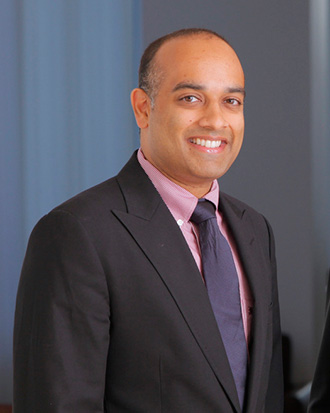
Dr. Rohan Ramakrishna, Alvina and Willis Murphy Assistant Professor of Neurological Surgery and the co-director of the William Rhodes and Louise Tilzer-Rhodes Center for Glioblastoma, was awarded a $50,000 grant from the Glioblastoma Foundation to study MRI-guided focused ultrasound for subcortical gliomas. This grant will determine the efficacy of this advanced technology for treating tumors in the subcortical area.
Dr. Ramakrishna will lead the research into MRI-guided focused ultrasound for gliomas with his team here at the Weill Cornell Medicine Brain and Spine Center. (The department has been at the forefront of the technology, which has proved remarkably effective for essential tremor and is also being studied for other uses. Find out more about focused ultrasound.)
Dr. Ramakrishna is no stranger to using new technologies to save lives—he’s trained in laser surgery, brain mapping, and stereotactic neurosurgery as well as in traditional open surgery. He aims to use advanced techniques to ensure maximal tumor removal and achieve the safest surgical outcome.
His research on subcortical gliomas is essential—any advances have the potential to improve patient quality of life and survival times. Subcortical gliomas are those that develop below the cortex, in areas that include the hippocampus, amygdala, basal ganglia, and basal forebrain. Tumors in the subcortical area are difficult to remove during surgery, hence the need for innovative new therapies such as focused ultrasound.
The Glioblastoma Foundation’s mission is to support the development of drug therapies for glioblastoma. It seeks to replace radiation and chemotherapy with small molecule therapy in an effort to increase quality of life and prolong survival.
More about Dr. Rohan Ramakrishna | More about Focused Ultrasound